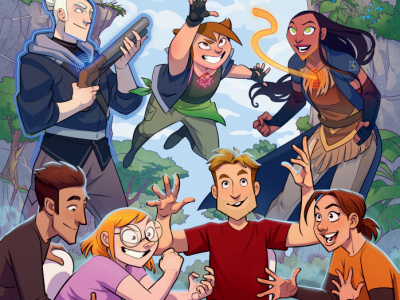Confessions of a Comic Book Guy is a weekly column by retailer Steve Bennett of Super-Fly Comics and Games in
Thanks to the Website goldenagecomics.com I've finally been able to live my childhood dream of reading (not reading about) Golden Age comics with magical titles like Exciting, Smash, Hit, etc. My goal is to read every comic book that's available, and while I've still got a sizable way to go to achieve it, I can say with some authority that characterization didn't matter much back then. For the most part the stories were all plot and action and everyone in them was either a cliche or stereotype, especially the heroes, who were all cardboard cutouts that might as well have had 'millionaire playboy' or 'two-fisted adventurer' scrawled on them.
Not like today, at least that's what we've been telling ourselves since the dawn of the Marvel Age of 'heroes with problems,' and over the years there's been competition among creators and publishers to create ever more 'realistic' superheroes. Even so, in a world where what fictional characters feel about what they do is increasingly more important than what they do, mainstream American comic books continue to lag far behind other media in this department.
Let's take as our example the hero of a popular series of detective novels, the Spencer books by Robert B. Parker. While they're not exactly great works of literature (even though the later entries have become increasingly overlong -- just give me a couple of uninterrupted hours and I can usually finish one in a day), they're quite enjoyable. But along with such genre elements as snappy dialogue, keen observations and explosive action, longtime readers are rewarded with what our kind call 'continuity,' i.e., how the characters and their relationships have changed over the course of the series.
While we never learn Spencer's first name, we do find out where he grew up, what he likes to drink and not only that he cooks but what he cooks and how he cooks it. And while these kinds of details might be considered as insignificant details that get in the way of the plot by some, it's exactly these kinds of small human details which allows the reader to relate to a character who is essentially, a fantasy private eye.
In comparison what do we really know about, say, Dick Grayson, longtime popular comic book character that some of us have known for decades? Besides his tortured relationship with his distant father figure and lengthy list of failed relationships, I mean. Even now in the glorious age of decompressed storytelling, there never seems to be enough space for us to get to know him as a person; what's his religion (if any), his ethnicity, what kind of books does he read, does he like Indian food, etc.?
The current Kids WB series The Batman takes a lot of guff from adult animation fans who consider it a kiddy show, but from it we've learned something about Bruce Wayne the comics have never told us; he likes nachos. OK, that's not exactly a gigantic revelation or anything and it was undoubtedly introduced to make the character seem more relatable (i.e., not so old) to the audience but really, what's wrong with that? It's certainly a darn sight better than the lazy trope of having a crabby Batman ignore yet another nutritious meal Alfred has painstakingly prepared for him so he can stare at a computer screen.
Unfortunately in comics these kinds of details are still considered insignificant; my favorite example of this being John Byrne's run on Wonder Woman. After he moved her to
I don't know why but if I had to hazard a guess it would be that Byrne didn't care and assumed his readers wouldn't either. And it's a valid point, maybe the majority of the current readership doesn't want to waste its time reading about the everyday minutiae of fantastical characters*, but it's long past time we stopped congratulating ourselves about our 'realistic' superheroes. Most superheroes remain cardboard cut-outs, just ones who've had rub-on flaws applied to them; and it hasn't made them any more realistic, just jerks.
And if anyone wonders why a large mainstream audience still hasn't embraced the superhero genre, maybe it's because there's precious little there for them to embrace. Though of course, there already are comics out there that pay attention to the emotional lives of their characters...
They're called manga.
* But I know I do. Just once I'd like to read a Tomb Raider story where she has to find an ancient mystic artifact, except this time it's on laundry day so she's wearing sweats and flip-flops, and the treasure is in the messy basement of somebody's suburban
The opinions expressed in this Talk Back article are solely those of the writer, and do not necessarily reflect the views of the editorial staff of ICv2.com.
Column by Steve Bennett
Posted by ICv2 on February 7, 2008 @ 11:00 pm CT
MORE TALK BACK
'How Would You Deal with This?'
April 15, 2024
Ralph DiBernardo of Jetpack Comics shares his frustrations on street release dates being ignored and the lack of consequences.
'We Need More Long-Term Thinking.'
November 30, 2023
In this Talk Back, Allen Berrebbi, Director of Business Development for Big Bang Comics, comments on the current state of the Direct Market and offers a couple of suggestions to help save it.
MORE COMICS
To Alliance Entertainment, LLC
April 11, 2025
The U.S. Bankruptcy Court has approved the sale of Diamond Comic Distributors, Alliance Game Distributors, Diamond Select Toys & Collectibles, and Collectible Grading Authority to Alliance Entertainment.
Tied to 'Crystal Heart Roleplaying Game'
April 11, 2025
Dark Horse will release a print edition of the Crystal Heart webcomic, in which four players learn and play the Crystal Heart tabletop roleplaying game, this fall.







